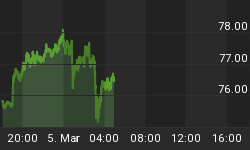While market participants are giddy with thoughts of a V-Shaped Recovery, and Bernanke is taking victory laps celebrating Orwellian Madness "We Saved The World" other members of the Fed are a bit more realistic.
For example, Fed's Lockhart sees protracted high unemployment.
"My forecast envisions a return to positive but subdued gross domestic product growth over the medium term weighed down by significant adjustments to our economy," Federal Reserve Bank of Atlanta President Dennis Lockhart said in prepared remarks.
"My forecast for a slow recovery implies a protracted period of high unemployment," said Lockhart, a voting member of the Fed's policy-setting committee this year.
"The challenge my colleagues and I face is navigating between the risk that early removal of monetary stimulus snuffs out the recovery and the risk that protracted monetary accommodation stokes inflation expectations that could ultimately fuel unwelcome inflationary pressures," he said.
"The Fed must deal with this tension, particularly in coming quarters, as we pursue our dual mandate of price stability and maximum employment," Lockhart added.
Dual Mandate Equals Mission Impossible
Here's the deal.
1. The Fed can control money supply but it will have no control over interest rates (or anything else).
2. The Fed can control short-term interest rates, but then it would have no control over money supply (or anything else).
That is the full and complete extent of the Fed's "control". Note that neither price stability nor unemployment is in either equation. The reason is the Fed controls neither.
Sure, the Fed can increase money supply but all those who thought it would necessarily cause prices to rise sure got it wrong.
The CPI is now a negative 2.1% year over year and my preferred measure called Case-Shiller CPI is running at negative 6.2% year over year. Please see What's the Real CPI? for details.
The simple truth of the matter is the Fed can print money, but it cannot control where it goes, or even if it goes anywhere at all. Indeed the Fed can encourage but not force banks to lend, and encourage but not force consumers to borrow.
The result of all the recent Fed printing is a big yawn, otherwise known as excessive reserves as the following chart shows.
Excess Reserves of Depository Institutions

Does that chart look like the Fed is in control? If so, control, of what?
Bear in mind that those excess reserves are a mirage. They do not really exist. Pending writeoffs in foreclosures, bankruptcies, credit cards, and especially commercial real estate will eat up those reserves and then some.
Although the Fed's "Dual Mandate" is complete nonsense, I do agree with Lockhart on one key point: The US economy will suffer with Structurally High Unemployment For A Decade.















